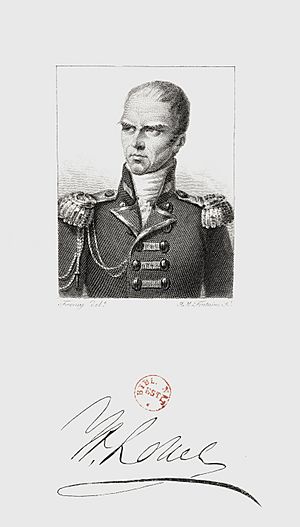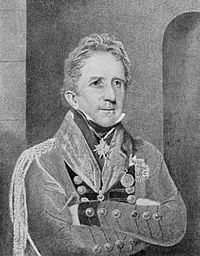Hudson Lowe facts for kids
Quick facts for kids
Hudson Lowe
|
|
|---|---|

Sir Hudson Lowe and his signature
|
|
| 14th General Officer Commanding, Ceylon | |
| In office 1826–? |
|
| Preceded by | James Campbell |
| Succeeded by | John Wilson |
| Personal details | |
| Born | 28 July 1769 |
| Died | 10 January 1844 (aged 74) |
| Military service | |
| Allegiance | United Kingdom |
| Branch/service | British Army |
| Rank | Major general |
| Commands | Royal Corsican Rangers General Officer Commanding, Ceylon |
Sir Hudson Lowe (born July 28, 1769 – died January 10, 1844) was an Anglo-Irish soldier and colonial administrator. He is most famous for being the Governor of St Helena. On this island, he was the "jailer" of Napoleon Bonaparte, the former Emperor of the French.
Contents
Sir Hudson Lowe's Life
Early Years and Military Beginnings
Hudson Lowe was born in Galway, Ireland. His father, John Lowe, was an army surgeon. Hudson spent his childhood in different army towns, especially in the West Indies. He went to school mainly at Salisbury Grammar.
When he was just eleven, he became an ensign in the East Devon Militia. In 1787, he joined his father's regiment, the 50th Foot. This regiment was serving in Gibraltar at the time. In 1791, he was promoted to Lieutenant. He took a long leave and traveled through Italy, choosing to avoid France because of the French Revolution.
Adventures in the Mediterranean
Serving in Corsica
Lowe returned to Gibraltar in 1793, just as Britain and France went to war. His regiment was sent to Toulon, but they arrived too late. The British forces had already left the city. They were then sent to Corsica, an island owned by France. British troops joined Corsicans there to fight the French.
Lowe's regiment helped during the Siege of Bastia and Siege of Calvi, which pushed the French off the island. He volunteered to get supplies from Livorno in Italy. During this trip, he almost died from malaria.
After he recovered, Lowe went back to Corsica. He served as an aide to the Governor in Ajaccio. In 1796, the British decided to leave Corsica. Lowe was moved to Elba and then to Lisbon. For two years, he was part of a British force protecting against French and Spanish attacks.
Lowe later fought in Elba, Portugal, and Menorca. In Menorca, he led a group of Corsican exiles called the Royal Corsican Rangers. These soldiers were trained as light infantry. He led the Corsican Rangers in Egypt from 1800 to 1801.
Fighting in the Napoleonic Wars
After a short peace, Lowe became a Major. When war with France started again in 1803, he was asked to form the Corsican battalion once more. He helped defend Sicily with them. He also helped capture Capri, but had to leave the island in 1808 due to a large attack by French forces.
In 1809, Lowe and his Corsican soldiers helped capture several other islands, including Ischia and Zante. For some months, he was the governor of Cephalonia and Santa Maura. He returned to Britain in 1812.
In 1813, he joined the armies fighting against Napoleon. He was at thirteen major battles and was praised for his bravery. He was chosen to bring the news of Napoleon's first defeat to London in April 1814.
He was made a knight and promoted to major-general. He also received awards from Russia and Prussia. In 1815, he was offered the job of guarding Napoleon, who had surrendered to the British. Lowe was to become the Governor of Saint Helena, where Napoleon would be exiled.
Guarding Napoleon on Saint Helena
When Lowe arrived at Plantation House, he found that Napoleon already had a difficult relationship with Admiral Sir George Cockburn. Lowe and Napoleon also had a very difficult relationship. They only met a few times. Lowe had strict orders from the British government, which made things harder. His own way of dealing with people also made the problems worse.
In October 1816, stricter rules were put in place. This happened because there were rumors of plans to rescue Napoleon. Lowe ordered guards to be placed around Napoleon's home, Longwood House, earlier in the evening. He also made sure a British officer saw Napoleon every day.
Lowe created many small rules. These included limiting Napoleon to the Longwood Estate. He also demanded that British officers call Napoleon only "General" instead of his Imperial titles. Lowe even asked Napoleon to pay for some of his imprisonment. Napoleon tried to sell some of his valuable silver, but this caused a public outcry in Europe, so the demand was dropped. Lowe also reduced the amount of firewood for Longwood. When news spread that Napoleon was burning his furniture to keep warm, public sympathy grew, and the firewood supply was restored.
These actions angered Napoleon and his followers. They spoke out against Lowe. Napoleon's doctor, Barry Edward O'Meara, eventually sided with Napoleon and criticized Lowe. The French, Russian, and Austrian officials on St. Helena also found it hard to get along with Lowe.
Some modern historians discuss Lowe's role in Napoleon's death. Lowe's strict rules and "house arrest" certainly affected Napoleon's health.
After Napoleon died in May 1821, Lowe returned to England. He received thanks from King George IV. However, he got little other reward from the British government. His handling of Napoleon caused public relations problems for Britain. The Duke of Wellington later said Lowe was "a very bad choice" and "a stupid man."
Lowe also helped end slavery on Saint Helena.
Later Career and Legacy
In June 1822, Lowe became the Colonel in Chief of the Sutherland Highlanders. From 1825 to 1830, he commanded the forces in Ceylon. He was not made governor there when the position became open. In 1831, he became colonel of the 56th (West Essex) Regiment of Foot. In 1842, he moved to lead his old regiment, the 50th (Queen's Own) Regiment of Foot. He also received a high honor, becoming a Knight Grand Cross of the Order of St Michael and St George.
Sir Hudson Lowe died in Chelsea, on January 10, 1844, at the age of 74.
Family Life
In London, on December 30, 1815, Hudson Lowe married Mrs. Susan Johnson. She was the daughter of Stephen De Lancey and the widow of Colonel William Johnson. They had five children together: two sons, Hudson Lowe (born 1816) and Edward William Howe de Lancey Lowe (born 1820), and three daughters, Camilla, Francis, and Clara Maria Susanna Lowe (born 1818). Lady Lowe passed away in London on August 22, 1832.
Lowe in Books and Movies
Sir Hudson Lowe has been shown in many films and books. Actors like Orson Welles and Ralph Richardson have played him in movies. He also appears in plays and books about Napoleon's time on Saint Helena.
 | Leon Lynch |
 | Milton P. Webster |
 | Ferdinand Smith |


